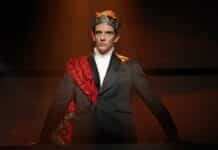In the works since the 1970s, the musical stage adaptation of The Baker’s Wife by Joseph Stein (book) and Stephen Schwartz (music and lyrics), based on the 1938 film La Femme du Boulanger by Marcel Pagnol, itself inspired by Jean Giono’s 1932 autobiographical novel Jean le Bleu, is now making its long-awaited NYC premiere Off-Broadway at Classic Stage Company. Set in the quaint French village of Concorde in 1935, the tale combines nostalgia, humor, romance, and discord in an intimate, immersive, star-studded period-piece with an outdated view of women and a squabbling community that can only agree on their love of fresh bread.
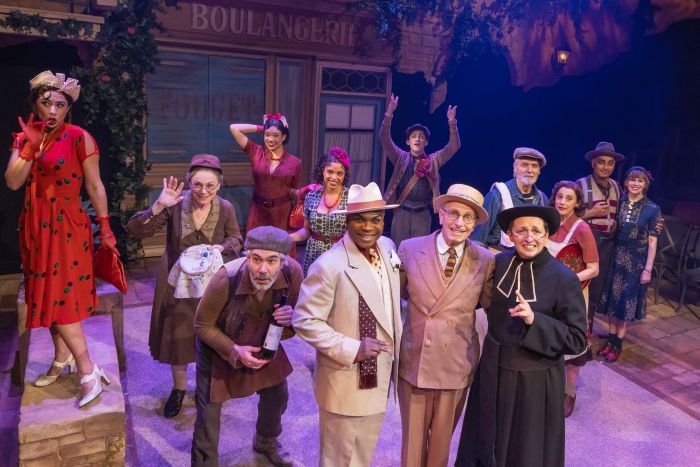
Directed by Gordon Greenberg, the audience is fully immersed in the staging, with some seated at café tables in the village square, a few invited by members of the cast to engage in a pre-show jeu de boules and a waltz, the characters moving through the aisles and around the house, and Denise, the wife of the café’s proprietor doing her chores and singing her “Chanson” in French and English, noticing our presence and directly addressing us with a welcome to the small town in Provence, where “nothing much changes” – until tonight, with the arrival of the new baker Aimable, after going weeks without bread since the death of the old one.
He enters with his new, much younger wife Genevieve and her cat Pompom, and, to the delight of the townsfolk, who mistake her for his daughter, provides them with more bread and pastries than he has ever sold in his life. But the beautiful Genevieve, who prefers that her husband call her by her first name, not Madame Castagnet, and never responds in kind to his frequent declaration “I love you,” is soon seduced by the young and attractive Dominique and runs off with him, leaving Aimable alone, distressed, and forgoing his baking. The community gathers, decides to go in search of Genevieve and to bring her back to Aimable, more out of concern for the bakery than for their marriage or his happiness, but changes in the process.
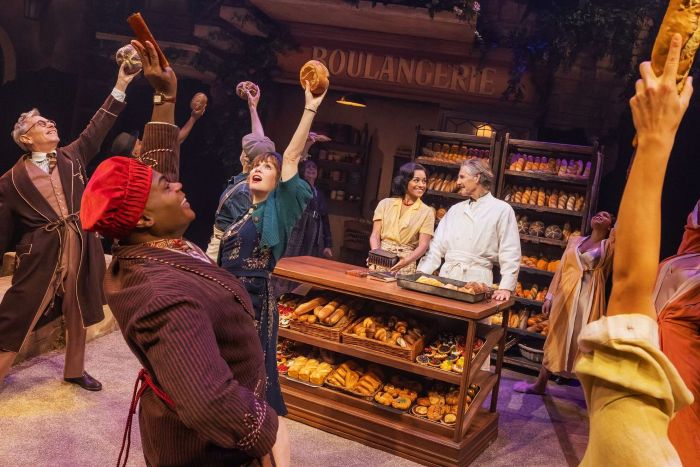
The old-fashioned show is filled with petty disagreements and laughable bickering (telling each other in song that they’d be happy neighbors “If It Wasn’t for You”), judgmental gossip and didactic preaching (the priest bemoans the sins lust but calls for forgiveness), thoughtless insults and the strains of long-time matrimony (noting that Aimable is the “Luckiest Man in the World” since he won’t have to deal with that), delivered by a cast of sixteen with inconsistent French accents. There are also anthropomorphic metaphors comparing the titular woman to a bird that should fly away to preserve its well-being (in the famed song “Meadowlark”) and the straying Pompom who presumably goes after a tomcat and only returns home when she is cold and hungry; the Marquis/Mayor offering Aimable the “Feminine Companionship” of his so-called “nieces” (his definition of a niece is one of the wittiest lines in the show); and the women villagers, when the men have gone off to find Genevieve, freeing themselves from the constraints of male domination by drinking, shimmying, and spreading their legs wide open (choreography by Stephanie Klemons) in a song and dance about the pitfalls of “Romance” – all of which present a very antiquated view of women becoming liberated.
Leading the cast are Scott Bakula and Ariana DeBose in the roles of the baker and his wife, expressing their feelings or lack thereof, manifesting little chemistry between them, or between her and her lover, played by Kevin William Paul, as she questions “Where Is the Warmth?” that she felt from the husband she left, and dances with each in keeping with the tone and attraction of their distinctly different connections.
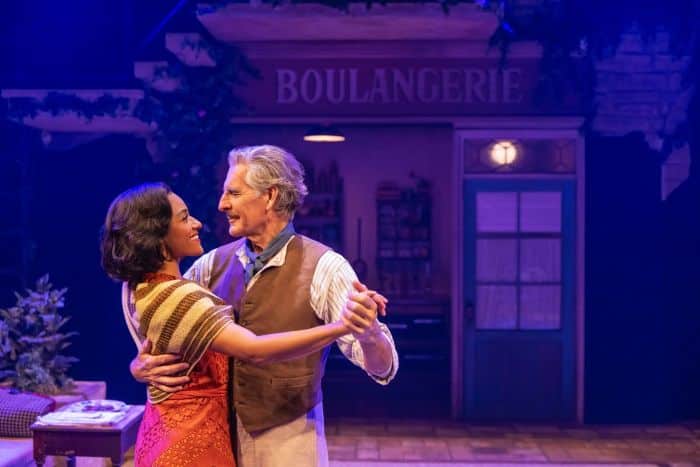
They are given stellar support by an engaging and funny featured cast – Judy Kuhn as the observant and sensitive Denise and Robert Cuccioli as her demeaning husband Claude, and Sally Murphy as Hortense, who’s had enough of her degrading marriage to Manu Narayan’s Barnaby (the men don’t speak to each other, nor have their forebears for generations, though nobody knows why); Mason Olshavsky as Dominique’s sidekick Philippe; Kevin Del Aguila as the clownish Antoine, who unthinkingly calls Aimable a cuckold and gives a long-winded roundabout account of discovering where Genevieve is; Will Roland as the Priest and Arnie Burton as the Teacher, both freely dispensing their ideals of morality and wisdom; Alma Cuervo as the judgmental spinster Therese; Nathan Lee Graham as the licentious Marquis; and Savannah Lee Birdsong, Samantha Gershman, and Hailey Thomas as his trio of lovers (not nieces!) Simone, Inez, and Nicole – accompanied in nineteen musical numbers by an outstanding nine-piece orchestra (music director/conductor Charlie Alterman on keyboard, Jacob Yates on keyboard and accordion, Janet Axelrod and Steve Kenyon on reeds, Whitney La Grange on viola, Kate Spingarn on cello, Tiffany Wu on harp, Steve Millhouse on bass, and Noah Hadland on percussion), with sumptuously rich orchestrations by David Cullen, enhanced with synth programming by Randy Cohen/Keyboards LLC.
The show’s artistic design is also especially appealing, with an historicizing bi-level set (by Jason Sherwood) of the village square, boulangerie, and café tables, balconies, arches, flowers, and a ladder, apropos props of the story-driving bread and bakery items (by Kathy Fabian/Propstar LLC), and authentic costumes (by Catherine Zuber), with hair and wigs (by Tom Watson), that transport us to the bygone era, enhanced with telling sound (by Jason Crystal) and evocative lighting (by Bradley King) that indicates the times of day, moods of the characters, and imaginings of their minds.
While The Baker’s Wife recalls a time and place that most enlightened viewers of today wouldn’t want to return to, it also underscores the value of not just having fresh bread available, but of a supportive and caring close-knit community that can live together in love, respect, and harmony. That’s a message worth hearing.
Running Time: Approximately two hours and 20 minutes, including an intermission.
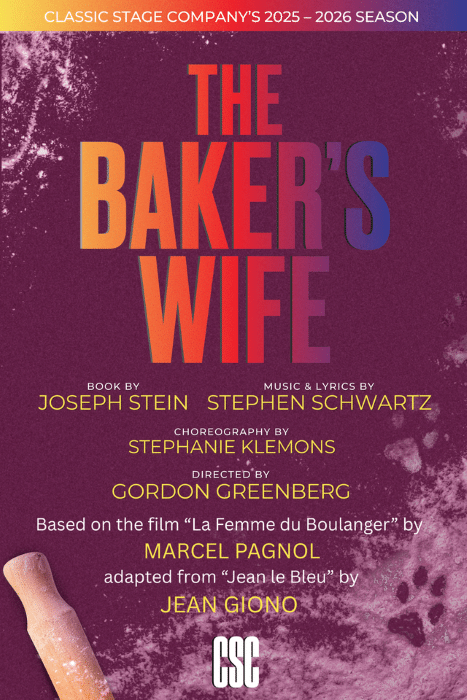
The Baker’s Wife plays through Sunday, December 21, 2025, at Classic Stage Company, 136 E 13th Street, NYC. For tickets (priced at $66-206, including fees), go online, or find discount tickets at TodayTix.

